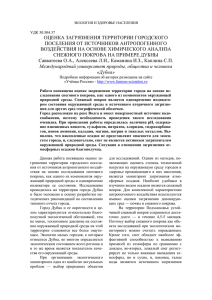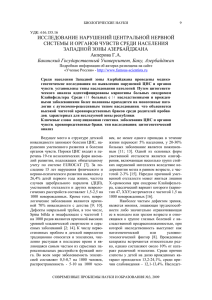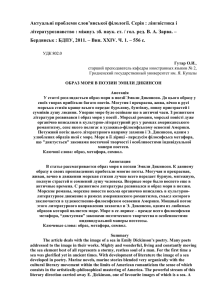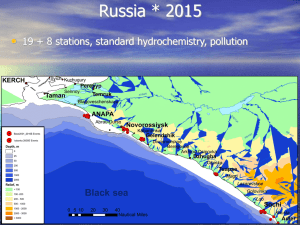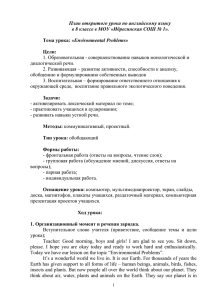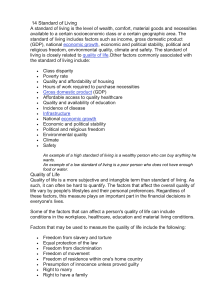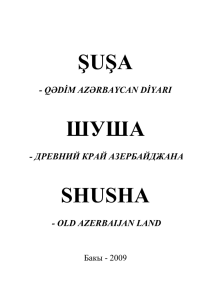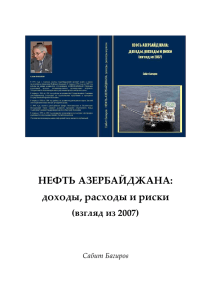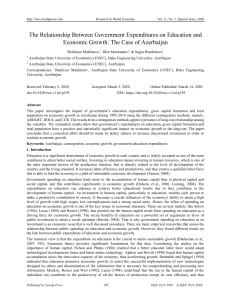2 Objectives of the workshop
реклама
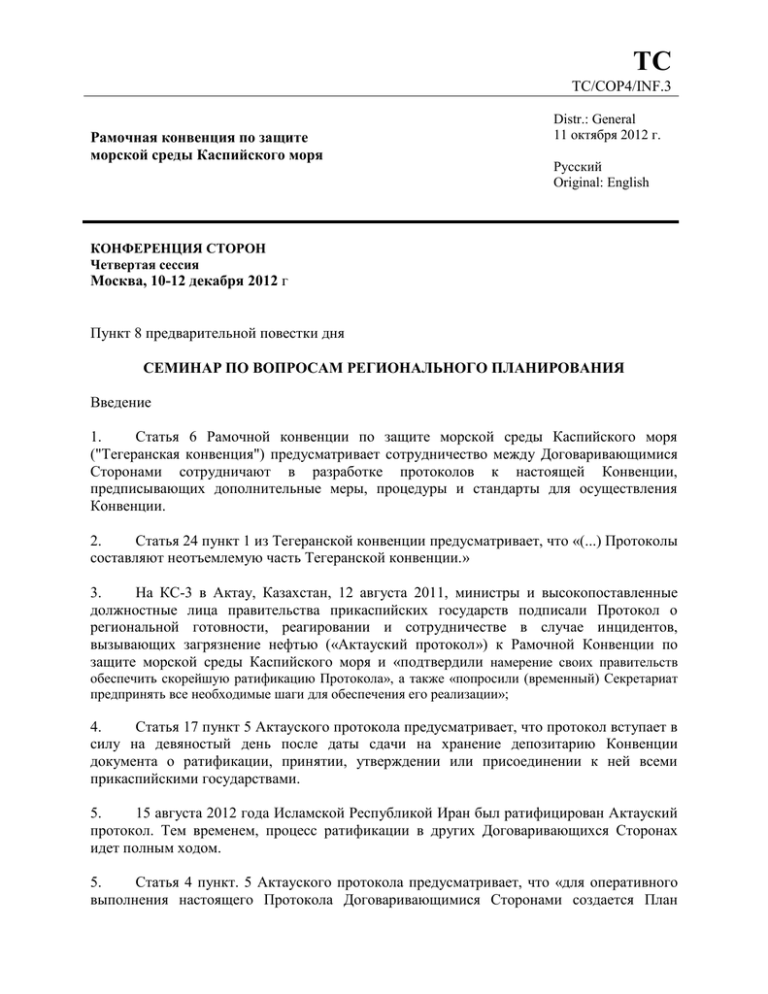
TC TC/COP4/INF.3 Рамочная конвенция по защите морской среды Каспийского моря Distr.: General 11 октября 2012 г. Русский Original: English КОНФЕРЕНЦИЯ СТОРОН Четвертая сессия Москва, 10-12 декабря 2012 г Пункт 8 предварительной повестки дня СЕМИНАР ПО ВОПРОСАМ РЕГИОНАЛЬНОГО ПЛАНИРОВАНИЯ Введение 1. Статья 6 Рамочной конвенции по защите морской среды Каспийского моря ("Тегеранская конвенция") предусматривает сотрудничество между Договаривающимися Сторонами сотрудничают в разработке протоколов к настоящей Конвенции, предписывающих дополнительные меры, процедуры и стандарты для осуществления Конвенции. 2. Статья 24 пункт 1 из Тегеранской конвенции предусматривает, что «(...) Протоколы составляют неотъемлемую часть Тегеранской конвенции.» 3. На КС-3 в Актау, Казахстан, 12 августа 2011, министры и высокопоставленные должностные лица правительства прикаспийских государств подписали Протокол о региональной готовности, реагировании и сотрудничестве в случае инцидентов, вызывающих загрязнение нефтью («Актауский протокол») к Рамочной Конвенции по защите морской среды Каспийского моря и «подтвердили намерение своих правительств обеспечить скорейшую ратификацию Протокола», а также «попросили (временный) Секретариат предпринять все необходимые шаги для обеспечения его реализации»; 4. Статья 17 пункт 5 Актауского протокола предусматривает, что протокол вступает в силу на девяностый день после даты сдачи на хранение депозитарию Конвенции документа о ратификации, принятии, утверждении или присоединении к ней всеми прикаспийскими государствами. 5. 15 августа 2012 года Исламской Республикой Иран был ратифицирован Актауский протокол. Тем временем, процесс ратификации в других Договаривающихся Сторонах идет полным ходом. 5. Статья 4 пункт. 5 Актауского протокола предусматривает, что «для оперативного выполнения настоящего Протокола Договаривающимися Сторонами создается План TC/COP4/INF.3 2 регионального сотрудничества по борьбе с загрязнением нефтью в случаях чрезвычайной ситуации на Каспийском море». 6. В 2001 году, одновременно с первой переговоры по протоколу о региональной готовности, реагировании и сотрудничестве в случае инцидентов, вызывающих загрязнение нефтью, первый проект Каспийского моря плане регионального сотрудничества был разработан на основе международных прецедентов, под эгидой и при финансовой поддержке Международной морской организации (ИМО) и Каспийская экологическая программа (КЭП). Проект плана был рассмотрен и обсужден между Правительством назначенных экспертов из прикаспийских государств в ряд региональных семинаров в период между 2001 и 2005 годами, но не был ни завершен, ни принят. 7. Планируется, что проект плана будет основываться на Национальных Планах Действий прикаспийских государств, и будет служить рабочим инструментом для координированного реагирования на случай разлива нефти в Каспийском море среди Договаривающихся Сторон. В проекте плана, в частности, предусматривается механизм оказания взаимной помощи, дается очерк распределения обязанностей и механизмов обмена информацией между прикаспийскими государствами, и определяются финансовые и административные основы для сотрудничества в случаях крупномасштабного разлива нефти инцидентов. 8. В связи с принятием и подписанием Актауского протокола всеми прикаспийскими государствами в 2011 году, ИМО и ЮНЕП совместно организовали Семинар по вопросам регионального планирования на случай разлива нефти на Каспии, 18-20 июня 2012 года в Баку, Азербайджан, с целью рассмотрения и придания нового импульса проекту Регионального Плана и его согласования с соответствующими положениями в соответствии с Актауским протоколом. Участники, в число которых вошли представители ИМО, временного Секретариата и РИГРН, а также правительственные эксперты из всех пяти прикаспийских государств, в чей круг обязанностей входят вопросы, связанные с готовностью к разливам нефти и реагирования, а также вопросы, связанные с процессом Тегеранской конвенции, провели обзор состояния готовности к реагированию на национальном и региональном уровнях в случае загрязнения нефтью; также рассмотрели и провели оценку проекта Плана, разработанного в 2005 году, по региональным разливам нефти в отношении процесса Тегеранской конвенции и положений Актауского протокола, и определили дальнейший путь доработки и реализации проекта Регионального Плана. Отчет о работе семинара, включающий список участников, приводится в Приложении I к настоящему документу. Конференция Сторон, возможно, пожелает: 9. Приветствовать и выразить свою благодарность ИМО за участие в организации и проведении Семинара по вопросам регионального планирования (Баку, Азербайджан, 18-20 июня 2012 года); одобрить выводы и рекомендации семинара, содержащиеся в разделе 7 отчета (TC/COP4/INF.3 Приложение I) и Просить временный Секретариат доложить об их осуществлении к КС-5. 3 TC/COP4/INF.3 Приложение I Regional Contingency Planning Workshop for the Caspian littoral States Baku, Azerbaijan 18 to 20 June 2012 5 TC/COP4/INF.3 Table of contents 1 INTRODUCTION ...................................................................................................................... 7 2 OBJECTIVES OF THE WORKSHOP ..................................................................................... 7 3 WORKSHOP PROGRAMME .................................................................................................. 8 4 LOCATION, DATES, ROLES AND PARTICIPANTS ............................................................. 8 5 SUMMARY OF PRESENTATIONS ......................................................................................... 9 5.1 OPENING CEREMONY .......................................................................................................................... 9 5.2 TECHNICAL PRESENTATIONS.................................................................................................................. 9 5.2.1 Introduction to the International legal framework .................................................................. 9 5.2.2 Role and contribution of the industry in regional preparedness and response ........................ 9 5.2.3 History of development of regional pollution preparedness .................................................... 9 5.2.4 Status review of pollution response arrangements of the Caspian littoral States ................. 10 5.2.5 Outline of the draft Regional Plan .......................................................................................... 11 5.2.6 Analysis of Draft Regional Plan against the Aktau Protocol .................................................. 11 5.2.7 Initial response and management/command structure ........................................................ 11 5.2.8 Response planning and strategy ............................................................................................ 11 5.2.9 Response operations .............................................................................................................. 12 5.2.10 Overview of work of the Organization for Security and Co-operation in Europe (OSCE) ....... 12 6 IDENTIFICATION OF A ROADMAP FOR UPDATE AND IMPLEMENTATION OF THE REGIONAL PLAN.............................................................................................................................................. 12 7 CONCLUSIONS AND RECOMMENDATIONS ..................................................................... 13 8 ANNEXES .............................................................................................................................. 13 8.1 8.2 ANNEX 1: WORKSHOP PROGRAMME ................................................................................................... 15 ANNEX 2: LIST OF PARTICIPANTS ......................................................................................................... 18 FACILITATORS/ORGANIZERS .................................................................................................................. 18 PARTICIPANTS ..................................................................................................................................... 18 5 TC/COP4/INF.3 6 EXECUTIVE SUMMARY Date: 18 to 20 June 2012, Baku, Azerbaijan Title: Regional Contingency Planning Workshop for the Caspian littoral States Organised by: • State Maritime Administration of the Republic of Azerbaijan • International Maritime Organization (IMO) • United Nations Environment Programme (UNEP) With the support of: • Oil Spill Preparedness Regional Initiative for the Caspian Sea, Black Sea and Central Eurasia (OSPRI) Number of participants: 40 The objectives of the workshop were to: • Review the status of oil pollution response preparedness nationally and regionally • Review the history of regional developments in pollution preparedness • Review and evaluate the 2005 regional oil spill contingency plan against current situation and identified needs • Identify any barriers to effective implementation of the regional plan • Strengthen relationships and cooperation between Caspian countries and with industry • Identify gaps and define the way forward in finalizing and implementing the regional oil spill contingency plan Results of the workshop: Delegates from all five countries off the Caspian Sea region participated in this Regional Contingency Planning Workshop for the Caspian littoral States. Various technical presentations were used to illustrate the different aspects of preparedness and response to oil pollution incidents. The presentations focused on incident management, response operations and response strategies, which are key elements of an efficient response to an oil pollution incident. Contingency planning and the requirements of the relevant international instruments, i.e. the OPRC Convention, CLC 92 and IOPC Funds Conventions, amongst others, were also discussed. The history of development of oil pollution preparedness and the regional oil pollution contingency planning process, as well as a review of the draft plan and identification of a possible way forward towards finalization and implementation of the regional plan were also undertaken and discussed in detail. During this workshop, participants had the opportunity to learn from each other and to identify recommendations for progressing on the regional plan. The diversity of participants and their active participation were important factors towards the success of this workshop. 6 TC/COP4/INF.3 7 1 Introduction Within the framework of its Technical Cooperation Programme, the International Maritime Organization (IMO), in collaboration with the United Nations Environment Programme (UNEP) and the Oil Spill Preparedness Regional Initiative for the Caspian Sea, Black Sea and Central Eurasia (OSPRI), with hosting provided by the State Maritime Administration of the Republic of Azerbaijan, organized a Regional Contingency Planning Workshop for the Caspian littoral States. This workshop took place from 18 to 20 June 2012, Baku, Azerbaijan, with representation from the five Caspian littoral States. Issues related to the status, finalization and implementation of the draft regional contingency plan were reviewed and discussed in detail, with a view to determining a way forward in progressing the plan, which has not moved forward since it was last reviewed in 2005. The workshop was also a good opportunity for the countries of the region to exchange information on past experiences and review status of implementation of the relevant international conventions related to oil pollution preparedness and response. 2 Objectives of the workshop The overall objective of this workshop was to raise awareness, address the regional oil pollution contingency plan and more generally to facilitate the implementation of the OPRC Convention in the region by improving the understanding and capabilities of the participating countries toward oil pollution incidents. In order to do so, a series of technical presentations were provided to describe the technical aspects of oil pollution response, combined with a detailed review of the status, history and text of the draft regional contingency plan. Knowledge of these key elements is essential for countries to effectively implement the provisions of the OPRC Convention and to develop and implement national level systems of response and, in particular, respective national level oil pollution contingency plans. More specifically, the workshop objectives were to: • Review the status of oil pollution response preparedness nationally and regionally; • Review the history and status of regional developments in oil pollution preparedness; • Review and evaluate the 2005 draft regional oil spill contingency plan against the current situation (i.e. Tehran Convention process and adoption of the Aktau Protocol) and identified needs; • Identify any barriers to effective implementation of the regional plan; • Strengthen relationships and cooperation between Caspian countries and with industry; and • Identify gaps and define the way forward in finalizing and implementing the regional oil spill contingency plan. 7 TC/COP4/INF.3 8 3 Workshop programme The workshop programme was composed of a combination of technical presentations and facilitated discussions related to the regional contingency planning process. In addition, a hypothetical case study was considered, detailing how an incident may unfold and identifying the type of interactions and coordination requirements that would be required, in particular if there were a request for assistance to one or more countries to support the response to a major incident. This programme aimed at promoting discussions and sharing of information between the facilitators and the participants. The presentations covered a range of technical and practical topics related to oil pollution preparedness and response, with a specific focus on contingency planning and on the regional plan in particular: Overview of HNS spill response and challenges; International legislation – The OPRC Convention, Regional Arrangements Overview, Compensation and liability – CLC, IOPCF, Bunkers Convention; Role and contribution of the industry in regional preparedness; History of development of regional pollution preparedness and response; Status review of pollution response arrangements of the Caspian littoral States; Outline of the draft regional plan and analysis against the Aktau Protocol; Incident management/command structure; Response planning and strategy, and response operations; and Roadmap for the update and implementation of the regional plan. The daily sessions took place daily from 900h to 1700h, with the exception of Wednesday when the workshop concluded at lunch time. An excursion to the premises of the Ministry of Emergencies site and the State Maritime Administration of the Republic of Azerbaijan was organized on the afternoon of Tuesday, 19 June, followed by a tour of the Old City of Baku. The visit to the Ministry of Emergencies allowed participants to view the oil pollution response equipment and resources that could be brought to bear in the event of an oil pollution incident, whilst the visit to the State Maritime Administration’s new premises allowed participants to view the state of the art vessel tracking systems in place in Azerbaijan and the Ops Centre that has been established at the premises. The detailed programme of the workshop can be found in Annex 1. 4 Location, Dates, Roles and Participants The workshop was organised by the State Maritime Administration of the Republic of Azerbaijan together with IMO and UNEP. It took place from 18 to 20 June 2012 in the conference room of the Europa Hotel, Baku, Azerbaijan. The experts that were involved in the facilitation of the workshop are as follows: Patricia Charlebois, Head Pollution Response, IMO Mahir Aliyev, Regional Coordinator, UNEP 8 TC/COP4/INF.3 9 Peter Taylor, Manager, OSPRI A total number of 40 participants from the Republic of Azerbaijan, the Islamic Republic of Iran, the Republic of Kazakhstan, the Russian Federation and Turkmenistan participated actively in this workshop. The participants list is set out in Annex 2. 5 Summary of presentations 5.1 Opening ceremony The workshop was opened by Captain Gudrat Gurbanov, Head, State Maritime Administration of the Republic of Azerbaijan and welcoming remarks were provided by Ms Patricia Charlebois, Head, Pollution Response Section, on behalf of IMO and Mr. Mahir Aliyev, Regional Coordinator, UNEP Regional Office for Europe, on behalf of UNEP. 5.2 Technical presentations Below is a summary of the technical presentations that were given during this workshop. 5.2.1 Introduction to the International legal framework Ms Patricia Charlebois presented the various international legal instruments applicable to oil pollution preparedness and response, as well as those related to liability and compensation in the event of oil pollution incidents from vessels. Participants were introduced to MARPOL, the OPRC Convention and OPRC-HNS Protocol, as well as the compensation and liability instruments, including CLC 92, Fund 92 and Supplementary Fund Protocol 2003, LLMC 96, Bunkers Convention and HNS Convention. The presentation indicated the requirements of these instruments, which aim at providing a framework for the development of national and regional capacity to prepare for and respond to oil pollution incidents and to compensate the victims of such incidents, through the international compensation regime. The requirements to facilitate international co-operation and mutual assistance were also discussed, as well as the status of ratification of these instruments in the Caspian region. 5.2.2 Role and contribution of the industry in regional preparedness and response Mr. Peter Taylor discussed the role of the petroleum industry and the resources and expertise that could be brought to bear in the event of a major oil pollution incident. The role and activities of OSPRI in the region were reviewed as was the Global Initiative, a partnership between IPIECA (the parent organization to OSPRI) and IMO was highlighted, which aims to bring governments and industry at local and regional levels to work together to build oil pollution response capacity. The tiered response structure was reviewed and participants were introduced to the various guidelines developed through IPIECA that would serve as useful resources for oil pollution response preparedness and planning. 5.2.3 History of development of regional pollution preparedness Mr. Mahir Aliyev reviewed the historic regional pollution preparedness and response developments, recalling the Tehran Convention process, which had set the stage for the Protocols that would follow, covering: The Protocol Concerning Regional Preparedness, Response and Co-operation in Combating Oil Pollution Incidents ("Aktau Protocol"); 9 TC/COP4/INF.3 10 The Protocol on Environmental Impact Assessment in a Transboundary Context; The Protocol on the Conservation of Biological Diversity; and The Protocol for the Protection of the Caspian Sea against Pollution from Land-based Sources and Activities. The signing of the Aktau Protocol was highlighted in particular, as it was the first of the Tehran Convention Protocols to be adopted in 2011, following eleven years of negotiation, and the provisions of the Protocol were reviewed. Mr. Peter Taylor recalled the history of development of the regional contingency plan, a draft of which had initially been developed in the early 2000s, funded by IMO, and considered through a series of workshops, the last of which had been held in 2005. 5.2.4 Status review of pollution response arrangements of the Caspian littoral States The five countries of the region presented the current status of pollution response arrangements in their respective countries. All five countries have made progress, with the Islamic Republic of Iran and the Russian Federation having national contingency plans in place and regularly tested. The remaining three countries, Kazakhstan, Turkmenistan and Azerbaijan all have their national contingency plans under review, though none have yet been adopted. 10 11 TC/COP4/INF.3 The status of ratification of the relevant international legal instruments is as follows: Country Azerbaijan CLC 69 CLC 92 x x Iran FUND 2003 OPRC 90 x x x x x Russian Federation d x Turkmenistan x x HNS 96 OPRC/ HNS 2000 x x Kazakhstan 5.2.5 FUND 92 Bunkers 01 x x x x x Outline of the draft Regional Plan Mr. Peter Taylor presented the draft regional plan, reviewing the purpose, objectives and scope of the plan, as well as the mechanisms for reporting incidents, requesting and receiving assistance, and the financial and administrative framework for the management of the plan and for the financing of assistance, when it is requested. The outstanding gaps were also highlighted, notably the information to be included in the annexes that provide the detailed national level information, which is still to be completed by the respective countries. 5.2.6 Analysis of Draft Regional Plan against the Aktau Protocol Ms Patricia Charlebois introduced the results of the review of the existing Draft Regional Plan against the requirements of the Aktau Protocol, identifying areas of congruence and remaining gaps. The main issue was the identification of a regional centre throughout the draft plan, which needs to be rectified, as this is part of the ongoing, broader dialogue on the institutional arrangements under the Tehran Convention, which is still pending agreement among the Caspian countries. In addition, there are some consistency and definition issues that will need to be addressed to harmonize the plan with the Aktau Protocol wording. The main gap identified was with regard to the country information that is to be included in the annexes. 5.2.7 Initial response and management/command structure Mr. Peter Taylor introduced the concept of the management/command structure for a major oil pollution incident, identifying the various roles and responsibilities of personnel involved in an oil pollution incident, how such expertise and resources could be managed and how such a structure could be expanded and managed to accommodate personnel and resources from other countries, when assistance is requested beyond the national level. Concepts such as the lead State, operational authority, joint operations and operational and tactical command, and the interactions and decision-making structures amongst these entities were discussed. 5.2.8 Response planning and strategy Ms Patricia Charlebois described the available response options and strategies in responding to an oil pollution incident both at sea and onshore and the considerations to be made in selecting 11 TC/COP4/INF.3 12 an appropriate response strategy, on the basis of the net environmental benefit analysis, amongst other considerations. This included the priorities to be considered in terms of shoreline protection, the potential use of chemical dispersants, and identifying the appropriate termination of the response. 5.2.9 Response operations Mr. Peter Taylor walked the group through a fictitious spill scenario in order to go through the various phases of operations, as set out in the regional contingency plan. Discussions on how this would be carried out at each phase in the process, i.e evaluation, notification and consultation, plan activation, request for assistance, joint response operations at sea and joint response operations on shore, were discussed among the group to determine how this may play out in a real incident. This also identified the considerations and challenges of communication with the public and with the media during response operations. 5.2.10 Overview of work of the Organization for Security and Co-operation in Europe (OSCE) This segment, presented by Mr. Emmanuel Huntzinger of the OSCE office in Baku, reviewed the role of OSCE and potential linkages and opportunities with regard to oil spill preparedness and response. The participants were provided information on the actions undertaken by the OSCE office in Baku in support of oil spill preparedness and how OSCE could continue to support the implementation of the regional plan in Azerbaijan. Reference was also made to the support also provided to such activities by the OSCE office in Kazakhstan. 6 Identification of a Roadmap for update and implementation of the regional plan Mr. Mahir Aliyev led a group discussion aimed at identifying the way forward with regard to updating and implementing the regional plan. A number of considerations were put forward with regard to the process and a series of influencing factors were identified. The points raised in terms of steps/considerations were as follows: • National contingency plans must be reviewed and brought in line with international conventions/requirements; • The regional plan could serve as a basis and driver for updating national plans; • Adoption procedures: There is a need to elaborate legal aspects/procedures for adoption of the plan by the five countries once finalized. It was identified that a memorandum, or other form of agreement was preferred, over a more formal and cumbersome adoption process; • The current draft of the plan needs to be updated to reflect current reality (regional centre/mechanism issue eliminated from the current draft); • Zones of intervention need to be defined in the plan; • The plan should be updated in line with the provisions in the Aktau Protocol and the annexes must still be completed by countries; • The regional plan needs to be considered at the national level and feedback provided based on national consultations; and 12 TC/COP4/INF.3 • 13 The plan may initially be considered by the COP of the Tehran Convention for agreement in principle, but in future, those directly involved in the plan will need to have the flexibility to meet and make modifications to the plan without having to go to the level of the COP. 7 Conclusions and recommendations Whilst completion of the regional plan could be easily accomplished, the political will at the national level may still present a challenge. Several of the Caspian countries are in the process of reviewing and updating their national plans (Kazakhstan, Turkmenistan and Azerbaijan), but these have yet to be approved, whilst Iran and the Russian Federation have well-established plans in place. There was also significant consideration with regard to the approval process for the regional plan, once finalized, and dialogue as to whether this should be put forward to the COP of the Tehran Convention for consideration and approval or whether approval should be sought via another mechanism. It was ultimately agreed that putting the plan, which may need to be updated regularly, to a formal political body such as the COP may create a cumbersome and lengthy approval process, which is in conflict with the need to be able to regularly review and update the plan, based on elements such as changes in national level structures/contacts, modifications based on lessons learned from actual incidents, etc. Noting the lengthy negotiations to arrive at consensus and adopt the Aktau Protocol (some 11 years), it was agreed that a cumbersome approval process should be avoided, to allow the necessary flexibility for updates, as needed. Discussions on how plans were adopted and approved in other regions, in particular based on the experiences of the Russian Federation (Baltic Sea, Black Sea and NOWPAP agreements) and Iran (ROPME regional plan), identified that a more practical approach was preferred and that this should be re-examined once the plan was finalized. As such, the following way forward and timeline was agreed by those present: 1. IMO to initiate an update of the regional plan, which will be produced by November 2012 (IMO); 2. Countries to complete the national level information that will be included in the annexes to the Plan and forwarded to IMO for inclusion by November 2012 (Caspian States); 3. Plan to be consolidated with both sets of information and status report submitted to COP 4 in December 2012 (IMO); 4. Consolidate plan (updated plan/annexes) to be distributed to countries – January 2013; 5. Countries consultation and commenting period on consolidated draft – January to April 2013; 6. Updated plan with comments received by IMO, May – Aug 2013; and 7. Finalized draft produced and circulated for final agreement and subsequent adoption – Sept 2013. 8 Annexes 8.1 Annex 1: Workshop Programme 13 13 TC/COP4/INF.3 14 8.2 Annex 3: Participants list 19 14 15 TC/COP4/INF.3 8.1 Annex 1: Workshop Programme Regional Contingency Planning Workshop for the Caspian littoral States Baku, Azerbaijan, 18 to 20 June 2012 Day 1 Monday , 18 June 2012 09:00 09:45 10.00 10.45 11.15 12.30 13.30 14.15 Opening of the workshop Welcoming addresses on behalf of: Government of Azerbaijan International Maritime Organization (IMO) United Nations Environment Programme (UNEP) Introduction Objectives of Workshop Roundtable Introduction of Participants Introduction to International legal framework – Part I (OPRC and OPRC-HNS Protocol, Regional Arrangements Overview) Refreshment break Introduction to the International legal framework – Part II (Compensation & Liability) Lunch Role and contribution of industry in regional preparedness and response (Contribution of petroleum industry, contribution of OSPRI, regional stockpiles and response resources) History of development of regional pollution preparedness and response 15.00 15.30 Refreshment break Status review of pollution response arrangements of Caspian littoral States 17.00 Past activities 2000-2003, Regional plan Tehran Convention Process & Aktau Protocol) Azerbaijan Islamic Republic of Iran Kazakhstan Russian Federation Turkmenistan Capt. G. Gurbanov P. Charlebois M. Aliyev P. Charlebois P. Charlebois P. Charlebois P. Taylor P. Taylor M. Aliyev Country representatives Close of Day 1 15 TC/COP4/INF.3 16 Day 2 Tuesday , 19 June 2012 09:00 09:45 10.30 11.00 Outline of the Draft Regional Plan P. Taylor A presentation providing a summary of the Plan’s main purpose and how it is structured. Participants will be encouraged to read and familiarize themselves with the Plan prior to the commencement of the workshop. Analysis of Draft Regional Plan against the Aktau Protocol P.Charlebois This segment will provide the results of the review of the existing Draft Regional Plan against the requirements of the Aktau Protocol, identifying areas of congruence and highlight any gaps. Refreshment break Initial response and management/command structure P. Taylor This segment will review the following components set out in the draft plan, notably: Operational Authority National On-Scene Commander / Supreme OnScene Commander Joint Emergency Response Centre Three components of command (i.e. Operational Command, Operational Control and Tactical Command) 12.30 13.30 Lunch Response planning and strategy The type of operations which could be employed and the available means to combat pollution at sea and onshore The need for field assessments Benefits and limitations of available strategies 15.00 15.30 Refreshment break Roadmap for update and implementation of the Regional Plan Discussion on how to move forward in updating the regional plan, including: the identification of any requirements for institutional arrangements, what national level plan development is needed to meet the regional plan requirements how to address any identified gaps, as well as any barriers to updating/implementation/use of plan P. Charlebois M. Aliyev 16 17 TC/COP4/INF.3 17.00 Stakeholder engagement Close of Day 2 Day 3 Wednesday , 20 June 2012 09:00 09:15 Review of day 2 Communications, reporting and public information This segment will review initial notification, situation reports, communications with the media and public 10.30 11.00 Refreshment break Overview of work of OSCE This segment will review the role of OSCE and potential linkages with regard to oil spill preparedness and response 11.30 Response Operations A fictitious ship source marine pollution incident will be used to walk through the six possible phases of operations: 1. Evaluation 2. Notification and consultation 3. Activation of the Plan 4. Request for assistance 5. Joint response operations at sea 6. Joint response operations on shore 12.30 13.30 Lunch Conclusion and next steps Summarize results of the workshop, identify conclusions and next steps in the Aktau Protocol implementation process Closing ceremony Government of Azerbaijan IMO UNEP 14.15 14.30 P. Charlebois E. Huntzinger P.Taylor P.Charlebois Capt. S. Mammadov P.Charlebois M. Aliyev Close of Workshop 17 18 TC/COP4/INF.3 8.2 Annex 2: List of Participants Facilitators/Organizers № 1 Name Ms Patricia Charlebois 2 Ms. Nina Schneider UNEP Tehran Convention Interim Secretariat 3 Mr. Peter Taylor OSPRI 4 Ms. Dinara Amanzholova OSPRI 5 Mr. Mahir Aliyev UNEP Tehran Convention Interim Secretariat Organization IMO Contact details E-mail:[email protected] Tel: +44 (0) 207 587 3163 Fax: +44 (0) 207 587 3210 E-mail:[email protected] Mob: +41 77 41 25 219 Tel: +41 22 91 78 696 E-mail: [email protected] Direct line: +44 1834 870 178 Mob: +44 7584 305 650 E-mail:[email protected] Skype: dinara23101981 Mob: +7 701 512 1013 E-mail:[email protected] Skype: mahir.aliyev Tel: +41 22 917 86 62 Mob: +41 79 538 82 46 Participants 1. Name Mr. Emmanuel Huntzinger Organization OSCE Office in Baku Contact details E-mail: [email protected] Tel:+ +994 12 497 2373 Mob: +994 50 255 6023 18 19 TC/COP4/INF.3 2. Name Mr. Askar Urazbagambetov Organization Kazakhstan 3. Mr. Serik Akhmetov Kazakhstan 4. Ms. Nesipgul Yesembayeva Kazakhstan 5. Mr. Anatoly Saveliev Russian Federation 6. Dr. Natalia Kutaeva Russian Federation 7. Ms Natalia Akulina Russian Federation 8. Mr. Akbar Rostami Islamic Republic of Iran 9. Ms. Farnaz Shoaie Islamic Republic of Iran 10. Mr. Reza Hossein Ghobakhloo Islamic Republic of Iran 11. Mrs.Kurbangozel Orazdurdyeva Turkmenistan Contact details E-mail: [email protected] tel: 8 (7172) 74 2210 Mob: 8 7011 91 2013 E-mail: [email protected] Tel: +7 7172 79 83 18 (106) Mob: +7 701 795 17 69 E-mail: esembaeva [email protected] Tel: +7 (7172) 24 3704 Mob: +7 (777) 22 36 105 E-mail:[email protected] Tel: +7 499 165 6381 Mob: +7 926 375 8048 E-mail:[email protected] Tel: +7 495 626 1806 Mob: +7 910 452 1993 E-mail:[email protected] Tel: +7 795 626 9470 Mob: +7 916 472 9452 E-mail: [email protected] Tel: +98 191 2112 204 Mob: +98 912 3465 018 E-mail:[email protected] Tel: +98 21 8823 3148 Mob: +98 912 334 1714 E-mail: [email protected] Tel: +98 21 8493 2192 Mob: +98 91 2326 0400 E-mail: [email protected]; [email protected] Tel: +993 93 23 14 Mob: +993 64 04 2637 19 20 TC/COP4/INF.3 12. Name Ms. Maya Hojiyeva Organization Turkmenistan Contact details E-mail: [email protected] Tel: +993 12 38 4980 Mob: +993 65 71 2945 13. Mr. Ahmad Ismayilov 14. Mr. Farhad Mammadov 15. Mr. Elchin Ganjaliyev 16. Ms. Nigar Abdurahmanova 17. Mr. Shamil Huseynov 18. Mr. Patrick Bender The State Maritime Administration of the Republic of Azerbaijan The State Maritime Administration of the Republic of Azerbaijan The State Maritime Administration of the Republic of Azerbaijan The State Maritime Administration of the Republic of Azerbaijan Parliament of the Republic of Azerbaijan “Seacor Marine AZ” LLC 19. Mr. Arif Isgandarov The Ministry of Emergency Situations of Azerbaijan Republic 20. Mr. Nazim Aghayev 21. Mr. Piri Guluzadeh 22. Mr. Anvar Karimov The Ministry of Emergency Situations of Azerbaijan Republic The Ministry of Emergency Situations of Azerbaijan Republic Ministry of Transport of Azerbaijan Republic E-mail: [email protected] Tel: +994 497 4405 (107) E-mail: [email protected] Tel: +994 497 4405 (114) E-mail:[email protected] Tel: +994 497 4405 (205) E-mail:[email protected] Tel: +994 497 4405 (231) E-mail: [email protected] Mob: +994 050 374 2142 E-mail:[email protected] Mob: +994 050 265 9054 E-mail: [email protected] Tel: +994 512 0492 Mob: +994 050 339 1052 E-mail: [email protected] Mob: +994 050 421 8635 N/A 23. Mr. Babek Tagiyev Baku International Trade Sea Port 24. Mr. Sabir Karimzadeh Caspian Sea Oil Fleet 25. Mr. Anar Ibrahimov Caspian Sea Oil Fleet E-mail: [email protected] Tel: +994 012 430 9943 Mob: +994 055 846 1060 N/A E-mail:[email protected] Mob: +994 050 333 2117 E-mail: [email protected] Mob: +994 050 230 0519 20 21 TC/COP4/INF.3 26. Name Ms. Lilia Fransuzova Organization Bue Caspian 27. Mr. Oruj Shiriyev Bue Caspian 28. Mr. James E. McHale BP 29. Mr. Hazi Nabiyev Caspian Marine Services 30. Mr. Bakhtiyar Muradov SASEPOL 31. Mr. Namiq Asgarov 32. Mr. Tahir Dadashov 33. Mr. Anar Tagiyev The Azerbaijan State Caspian Sea Shipping Company The Azerbaijan State Caspian Sea Shipping Company Ministry of Ecology and Natural Resources of Azerbaijan Republic 34. Mr. Bakhtiyar Seyidov 35. Mr. Rasim Sattarzade 36. Mr. Rustam Rustamzade 37. Mr. Mammad Nasibov 38. Mr. Hasan Asadov Ministry of Ecology and Natural Resources of Azerbaijan Republic Ministry of Ecology and Natural Resources of Azerbaijan Republic The State Oil Company of Azerbaijan Republic (SOCAR) The State Oil Company of Azerbaijan Republic (SOCAR) The State Border Service of Azerbaijan Republic Contact details E-mail: [email protected] Mob: +994 050 255 4127 E-mail: [email protected] Mob: +994 050 255 4102 E-mail: [email protected] Mob: +994 055 425 0816 E-mail: [email protected] Mob: +994 050 342 4997 N/A E-mail:[email protected] Mob: +994 050 663 5961 E-mail:[email protected] Mob: N/A E-mail:[email protected] Tel: +994 050 783 4248 Mob: +994 055 455 4248 N/A E-mail:[email protected] Tel: +994 124 982 346 E-mail:[email protected] Mob: +994 050 208 0369 E-mail:[email protected] Mob: +994 050 208 0349 E-mail:[email protected] Mob: +994 055 397 1111 21 22 TC/COP4/INF.3 39. Name Mr. Nijat Rustamov 40. Felix Agayev Organization The State Border Service of Azerbaijan Republic BP Contact details E-mail:[email protected] Mob: +994 055 217 4799 E-mail:[email protected] Mob: +994 055 225 0215 __________ 22
